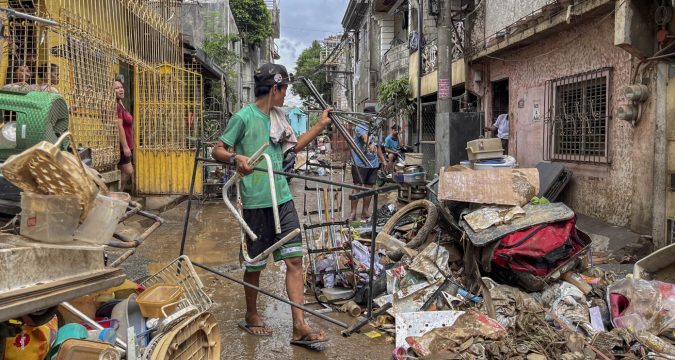
MANILA (UCAN): Protesters marched on the streets across the Philippines to express their anger after a probe report exposed massive graft in state-funded flood control projects.
On September 5, a group of activists held a rally outside the House of Representatives to voice their dissent, and a clash broke out as police attempted to disperse them. In Cebu City, central Philippines, members of the progressive group, Bayan-Central Visayas, threw tomatoes at the logo and marker of the Department of Public Works and Highways [DPWH] outside its offices.
On September 4, activists and victims of recent flooding deface the gate of St. Gerald Construction in Pasig City, in Manila, with mud. The private company is owned by the Discaya family, now subject of a government anti-graft probe.
The report, from the Philippine Center for Investigative Journalism [PCIJ], which was released on August 31, revealed that huge sums had been wasted on failed and non-existent flood control projects since 2022. The massive graft led to poor flood control in Metro Manila and various provinces, causing immense suffering to people, the report said.
St. Gerald Construction and its subsidiaries were linked to 421 flood control projects totaling 31 billion pesos [US$544 million], including non-existent, poorly designed, and overpriced projects across the country, the PCIJ report said.
St. Gerald Construction and its subsidiaries were linked to 421 flood control projects totaling 31 billion pesos [US$544 million], including non-existent, poorly designed, and overpriced projects across the country
Philippine Center for Investigative Journalism
Police seized 40 luxury cars, reportedly worth between 337-465 million pesos, belonging to Discaya family members, as part of a government probe.
Official data shows that the Philippine government allocated 80 billion pesos for 9,855 flood control projects from 2022 to 2025.
However, flooding caused by recent typhoons such as Wipha [Crising], Francisco [Dante], Co-may [Emong], and the enhanced monsoon caused damages of about 6.12 billion pesos and displaced tens of thousands of people, reports say.
Critics attributed people’s suffering to political corruption linked to flood projects.
As we celebrate the 500 years of Christianity in the Philippines. The Chaplaincy to Filipino Migrants organises an on-line talk every Tuesday at 9.00pm. You can join us at:
https://www.Facebook.com/CFM-Gifted-to-give-101039001847033
“Every peso pocketed by the Discayas and corrupt politicians translates to another family submerged in floodwaters, another farmer’s livelihood destroyed, another community displaced,” People Suge, a national citizens’ alliance, said in a statement on September 4.
“The government itself has become a disaster—turning public funds meant for protection and resilience into cash cows for plunder,” it added.
The government itself has become a disaster—turning public funds meant for protection and resilience into cash cows for plunder
People Suge
The group warned that the government’s failure to end mass graft can trigger a public uprising like the one in Indonesia last week. It also announced that a massive national rally will be held in Manila on September 21 to express public dismay over the graft scandal.
This scandal “is not an isolated incident but a glaring example of the systemic corruption that bleeds the nation dry, while ordinary Filipinos suffer from poverty, disasters, and lack of basic services,” said Teddy Casino, chief of progressive group, Bayan.
Malacañang Palace unveiled a new public website to show ongoing flood control projects and urged people to report any form of irregularities.
Earlier, the Catholic Bishops’ Conference of the Philippines [CBCP] issued a statement denouncing political corruption linked to flooding and urged people to “make corruption shameful again.”
Pablo Virgilio Cardinal David, head of the CBCP said, “If floodwaters rise because public funds are stolen, the greater flood is the corruption that drowns our future. We cannot build a nation on the foundations of systematic corruption.”










